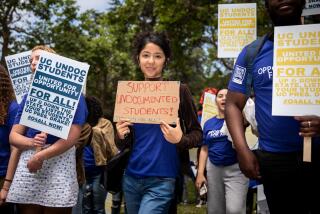Silicon Valley leaders take up the Dream on behalf of young migrants
A group of Silicon Valley technology leaders is working to help undocumented students attend college, prepare for jobs and, when possible, find ways to legalize their status.
The group, described by Palm Pilot inventor Jeff Hawkins as a loose coalition, is looking to provide assistance and guidance to students in the absence of legislation such as the Dream Act, which would create a path to citizenship for young illegal immigrants who are college students and military service members.
Much of the group’s work and donations have gone to Educators for Fair Consideration (E4FC), which provides scholarships, internships, legal assistance and other programs for undocumented students.
In addition to Hawkins, the family foundations of Mark Leslie, founding chairman and chief executive of the former Veritas Software Corp., and Andrew Grove, co-founder of Intel Corp., have made thousands of dollars in donations to E4FC. Laurene Powell Jobs, widow of Apple’s Steve Jobs, has also helped promote access for undocumented students through organizations and personal advocacy. The group’s work was first reported Monday by the Wall Street Journal.
“We have these kids who grew up here, went to school here. They’re American kids, they have no other home and essentially we’re abandoning them,” said Hawkins. “They have a hard time getting an education and they have no prospects for work.”
E4FC was started in 2006 with about $5,000 in donations, said Executive Director Katharine Gin. At the time, she said, the group hoped to provide basic information and scholarship money. Until last year, many of its members believed legislation to legalize students was imminent.
“A lot of us were telling these students: ‘Just get through college and we’ll worry about the rest later,’” Gin said. “Now people are trying to figure out what we can do, trying to figure out something meaningful if we can’t trust that immigration reform is going to happen.”
The organization now has an operating budget of $600,000, a significant portion of which comes from a handful of Silicon Valley donors, Gin said.
An online case analysis service allows students to submit information about their immigration status for review for possible legal remedies. Several students who benefited from the group’s scholarships have returned after graduation for internships, often because they cannot find employment in their fields, Gin said.
The group is trying to connect students with businesses to secure internships that might lead to an employer-sponsored visa.
“This is not a tenable solution long term,” Hawkins said. “I’m hoping eventually people will wake up and say, ‘We can’t do this to these kids.’ But in the meantime we’re losing these kids. What can we do now to help them?”
Powell Jobs has worked to help undocumented students through her work with College Track and Emerson Collective, which provide resources, services and advocacy on behalf of high school and college students, many of whom lack legal status. She has also advocated publicly for the passage of the Dream Act and helped promote a summer internship program for so-called Dreamers.
“We work closely with undocumented students who aspire to become America’s next generation of engineers, scientists, entrepreneurs, and teachers, but lack a clear path to do so,” Powell Jobs said in a statement. “We believe that Congress should create a principled path where these students can earn their citizenship and become productive, tax-paying members of our society.”
Mario Lio, 23, found E4FC while searching for scholarships. The undocumented civil engineering major at UC Berkeley was unsure whether he would be able to finish school because of tuition and housing costs.
But with financial help from E4FC and others, he managed to graduate in May 2010. Still, Lio does not have a path to legalization and had to turn down graduate school in Pennsylvania because of the costs. He was eventually able to get into a master’s program closer to home.
Lio said he is heartened to know that some Silicon Valley leaders are pushing to help students like him.
“It’s a big statement. It says that they want us here,” he said. “They can’t change the law, but they can at least make the statement that they’re willing to support us.”







